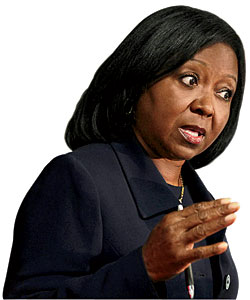The oft-maligned Church of Scientology needs whatever friends it can get after the searing HBO documentary Going Clear. Followers still have at least one in, of all places, Springfield.
State representative Mary Flowers, a Democrat whose district stretches from the Auburn Gresham neighborhood to Countryside in the southwestern suburbs, is sponsoring legislation that bears Illinois Scientologists’ imprint. The resolution, picking up where she left off two years ago with a similar bill, would drag the state into a debate over the American Psychiatric Association’s definition of mental illnesses.
Scientologists have long contended that psychiatry is essentially bunk. (Remember Tom Cruise’s 2005 rant against antidepressants?) According to the church’s website, its members founded the Citizens Commission on Human Rights in 1969 to protect people from “abusive or coercive psychiatric practices.” How seriously do they believe in this abuse? The group’s museum is named Psychiatry: An Industry of Death.
House Resolution 7 marks another foray into Illinois lawmaking by Scientologists. They have previously pressed the state—unsuccessfully—to name a day after founder L. Ron Hubbard and to get a children’s booklet mentioning him distributed in public schools. Scientologist Nancy Cartwright, the voice of Bart Simpson, testified before the House in support of the booklet, How to Make Good Choices. (Ay, caramba!)

At Scientologists’ urging, Flowers is targeting the APA’s latest update of its standard reference, the Diagnostic and Statistical Manual of Mental Disorders. Her resolution says state laws regarding competence, criminal responsibility, and disability all use the manual’s definitions of mental illness. CCHR, however, on its website calls DSM-V a “pseudoscientific sham.”
Flowers’s legislation aims to create a 12-person task force that would scour state law, including statutes about special education and assisted living, for references based on “recently discredited” assumptions made in the manual. Thomas Insel, director of the National Institute of Mental Health, for one, has criticized in a blog post the DSM-V’s “lack of validity” and failure to back its definitions with data.
The updates, Flowers contends in her resolution, could lead to the “overdiagnosis of new or rare disorders, the loss of access to mental health services by persons whose condition may no longer be recognized, and possible misdiagnosis of autism.” Flowers’s task force would recommend “best practices” that could prompt a wave of new legislation around how Illinois defines mental illnesses.
At the heart of her worries, she says, are wards of the state receiving psychotropic drugs despite unresolved safety questions. Overdiagnosis, she believes, leads to overmedication. In Illinois, the Department of Children and Family Services administers such medications to 12 children under age four to treat seizures or as sleep aids, an agency spokesman says. Each case went through a multitiered review before drugs were prescribed.
Flowers insists that she isn’t a Scientologist, that she is Catholic, but acknowledges she has been contacted by adherents who share her concerns about psychotropic drugs. “I don’t know anything about Scientologists. I’m going to put a period right there,” says Flowers. She credits them, though, with introducing her to the DSM-V, which she says has “made it easier for people to be diagnosed with some form of mental illness.”
The House defeated two similar resolutions Flowers drafted in 2013. The first time, the resolution lost 46–67. Then the second time, the House crushed the identically worded resolution with a 22–92 vote after Rep. Ed Sullivan linked it to Scientology. Sullivan’s personal experience involves a male relative, a Scientologist, who lost a successful business and whose marriage ended in divorce.
Flowers counters that Sullivan’s personal disdain for Scientology misses her point. “It’s about kids and adults being overmedicated.”
Wilmette lawyer S. Randolph Kretchmar, a Scientologist who approached Flowers about the updated guidelines, calls her a “brilliant woman” for taking up the issue. “You realize the language of the statutes are meaningless without the DSM as a reference, and it’s a bad reference,” Kretchmar says.
The Illinois Psychiatric Society disagrees, saying no evidence supports stripping the DSM-V from state law. “It just doesn’t seem to be a worthwhile use of our legislators’ time,” says Meryl Camin Sosa, IPS’s executive director.
But Kretchmar believes Flowers’s chances for pushing through the legislation have improved because of respected voices, such as Insel, speaking out. “It’s much, much less controversial to question the DSM now than it was,” he says.
Whatever happens, the legislative maneuvering shows how disparate forces can unite when their interests align, creating a logical, if strange, marriage of religion and politics.



